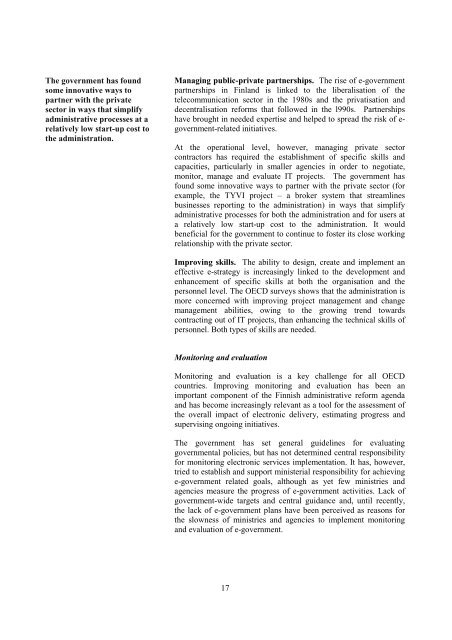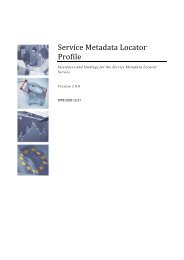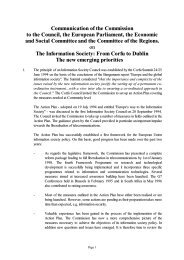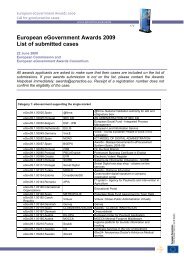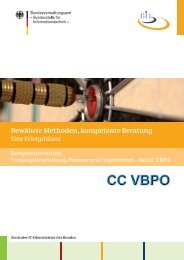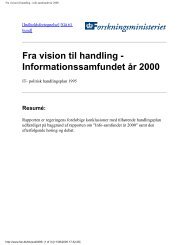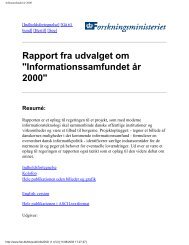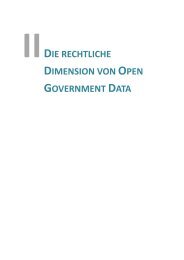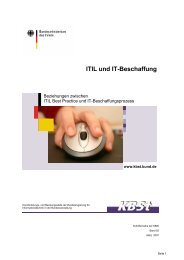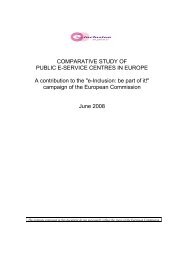e-GOVERNMENT IN FINLAND - ePractice.eu
e-GOVERNMENT IN FINLAND - ePractice.eu
e-GOVERNMENT IN FINLAND - ePractice.eu
Create successful ePaper yourself
Turn your PDF publications into a flip-book with our unique Google optimized e-Paper software.
The government has found<br />
some innovative ways to<br />
partner with the private<br />
sector in ways that simplify<br />
administrative processes at a<br />
relatively low start-up cost to<br />
the administration.<br />
Managing public-private partnerships. The rise of e-government<br />
partnerships in Finland is linked to the liberalisation of the<br />
telecommunication sector in the 1980s and the privatisation and<br />
decentralisation reforms that followed in the l990s. Partnerships<br />
have brought in needed expertise and helped to spread the risk of egovernment-related<br />
initiatives.<br />
At the operational level, however, managing private sector<br />
contractors has required the establishment of specific skills and<br />
capacities, particularly in smaller agencies in order to negotiate,<br />
monitor, manage and evaluate IT projects. The government has<br />
found some innovative ways to partner with the private sector (for<br />
example, the TYVI project – a broker system that streamlines<br />
businesses reporting to the administration) in ways that simplify<br />
administrative processes for both the administration and for users at<br />
a relatively low start-up cost to the administration. It would<br />
beneficial for the government to continue to foster its close working<br />
relationship with the private sector.<br />
Improving skills. The ability to design, create and implement an<br />
effective e-strategy is increasingly linked to the development and<br />
enhancement of specific skills at both the organisation and the<br />
personnel level. The OECD surveys shows that the administration is<br />
more concerned with improving project management and change<br />
management abilities, owing to the growing trend towards<br />
contracting out of IT projects, than enhancing the technical skills of<br />
personnel. Both types of skills are needed.<br />
Monitoring and evaluation<br />
Monitoring and evaluation is a key challenge for all OECD<br />
countries. Improving monitoring and evaluation has been an<br />
important component of the Finnish administrative reform agenda<br />
and has become increasingly relevant as a tool for the assessment of<br />
the overall impact of electronic delivery, estimating progress and<br />
supervising ongoing initiatives.<br />
The government has set general guidelines for evaluating<br />
governmental policies, but has not determined central responsibility<br />
for monitoring electronic services implementation. It has, however,<br />
tried to establish and support ministerial responsibility for achieving<br />
e-government related goals, although as yet few ministries and<br />
agencies measure the progress of e-government activities. Lack of<br />
government-wide targets and central guidance and, until recently,<br />
the lack of e-government plans have been perceived as reasons for<br />
the slowness of ministries and agencies to implement monitoring<br />
and evaluation of e-government.<br />
17


